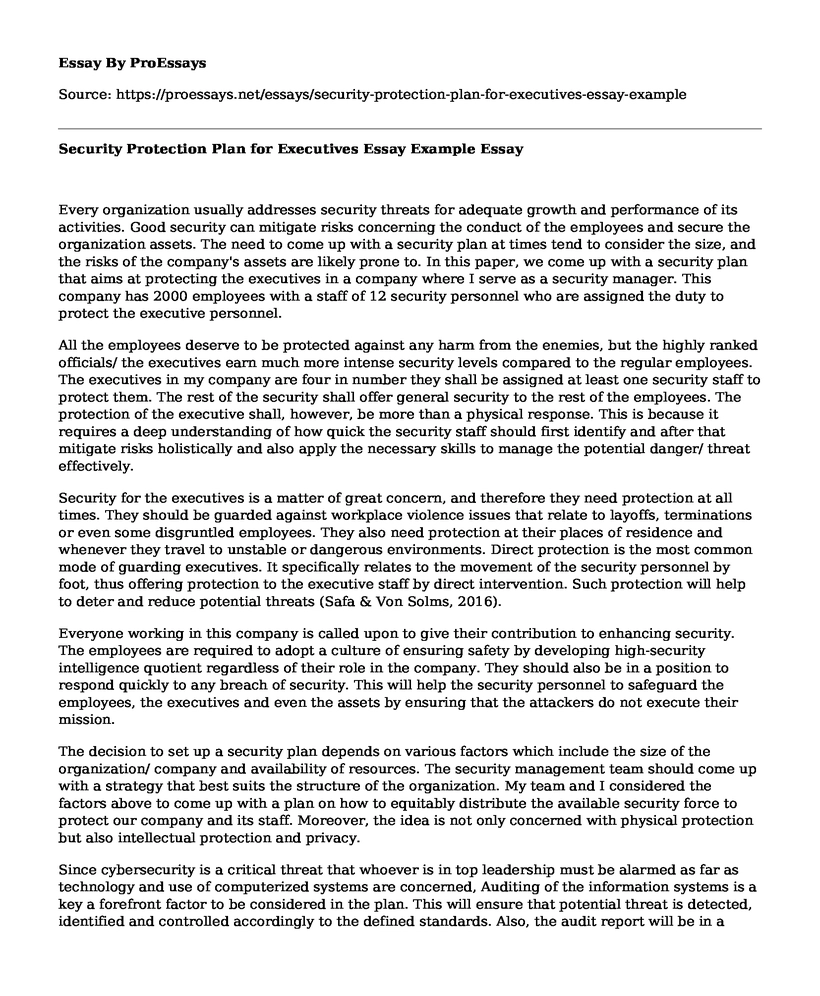Every organization usually addresses security threats for adequate growth and performance of its activities. Good security can mitigate risks concerning the conduct of the employees and secure the organization assets. The need to come up with a security plan at times tend to consider the size, and the risks of the company's assets are likely prone to. In this paper, we come up with a security plan that aims at protecting the executives in a company where I serve as a security manager. This company has 2000 employees with a staff of 12 security personnel who are assigned the duty to protect the executive personnel.
All the employees deserve to be protected against any harm from the enemies, but the highly ranked officials/ the executives earn much more intense security levels compared to the regular employees. The executives in my company are four in number they shall be assigned at least one security staff to protect them. The rest of the security shall offer general security to the rest of the employees. The protection of the executive shall, however, be more than a physical response. This is because it requires a deep understanding of how quick the security staff should first identify and after that mitigate risks holistically and also apply the necessary skills to manage the potential danger/ threat effectively.
Security for the executives is a matter of great concern, and therefore they need protection at all times. They should be guarded against workplace violence issues that relate to layoffs, terminations or even some disgruntled employees. They also need protection at their places of residence and whenever they travel to unstable or dangerous environments. Direct protection is the most common mode of guarding executives. It specifically relates to the movement of the security personnel by foot, thus offering protection to the executive staff by direct intervention. Such protection will help to deter and reduce potential threats (Safa & Von Solms, 2016).
Everyone working in this company is called upon to give their contribution to enhancing security. The employees are required to adopt a culture of ensuring safety by developing high-security intelligence quotient regardless of their role in the company. They should also be in a position to respond quickly to any breach of security. This will help the security personnel to safeguard the employees, the executives and even the assets by ensuring that the attackers do not execute their mission.
The decision to set up a security plan depends on various factors which include the size of the organization/ company and availability of resources. The security management team should come up with a strategy that best suits the structure of the organization. My team and I considered the factors above to come up with a plan on how to equitably distribute the available security force to protect our company and its staff. Moreover, the idea is not only concerned with physical protection but also intellectual protection and privacy.
Since cybersecurity is a critical threat that whoever is in top leadership must be alarmed as far as technology and use of computerized systems are concerned, Auditing of the information systems is a key a forefront factor to be considered in the plan. This will ensure that potential threat is detected, identified and controlled accordingly to the defined standards. Also, the audit report will be in a position to illustrate the level of security of the information systems so that a sound decision may be made concerning the protection of the company's data. This approach will be able to show the current position of the company and the anticipated concerns regarding the safety of all information systems. Thus, the plan will ensure that the company's approach ascertains data and information confidentiality, integrity and accountability (Safa & Von Solms, 2016). This approach will not only be applied to the top executive, but also to the other employees in the organization, who are system end users.
Ensuring that there are regular checkups concerning security threats such as patrolling and scanning for malicious items using metal detectors and other gadgets will ensure that other executives are safeguarded. Thus, this approach has been included in the plan to certify security. Moreover, providing that only authorized persons can meet the executives at a particular time and place will minimize security threats and maximize the level of protection.
Conclusion
Finally, some other issues such as the number of security officers needed to ensure safety, the level of security required at some points, educating and training the executives, the number of executives who need high level of protection and the resources necessary to certify safety will be included while formulating the executive security program (McIlwraith, 2016).. Therefore, the company's executives will be able to perform their tasks in a conducive work environment that guarantee security so that I may ensure the goals and the objectives of the company are achieved.
References
McIlwraith, A. (2016). Information security and employee behavior: how to reduce risk through employee education, training, and awareness. Routledge.
Safa, N. S., & Von Solms, R. (2016). An information security knowledge sharing model in organizations. Computers in Human Behavior, 57, 442-451.
Cite this page
Security Protection Plan for Executives Essay Example. (2022, Dec 10). Retrieved from https://proessays.net/essays/security-protection-plan-for-executives-essay-example
If you are the original author of this essay and no longer wish to have it published on the ProEssays website, please click below to request its removal:
- Purchasing Agent for Zircon Delivery Services: Accept or Don`t Accept the Offer
- Sustainable Change Essay Example
- Essay Sample on Leadership and Management Behaviors
- The Necessary Essentials for Financial Viability in Healthcare Paper Example
- Adapt or Fail: Change is Inevitable for Organizations - Essay Sample
- Strategizing Leadership for Market Success: A Case Study
- Current Issues Facing CPDLC Deployment in US: Challenges & Solutions - Essay Sample







